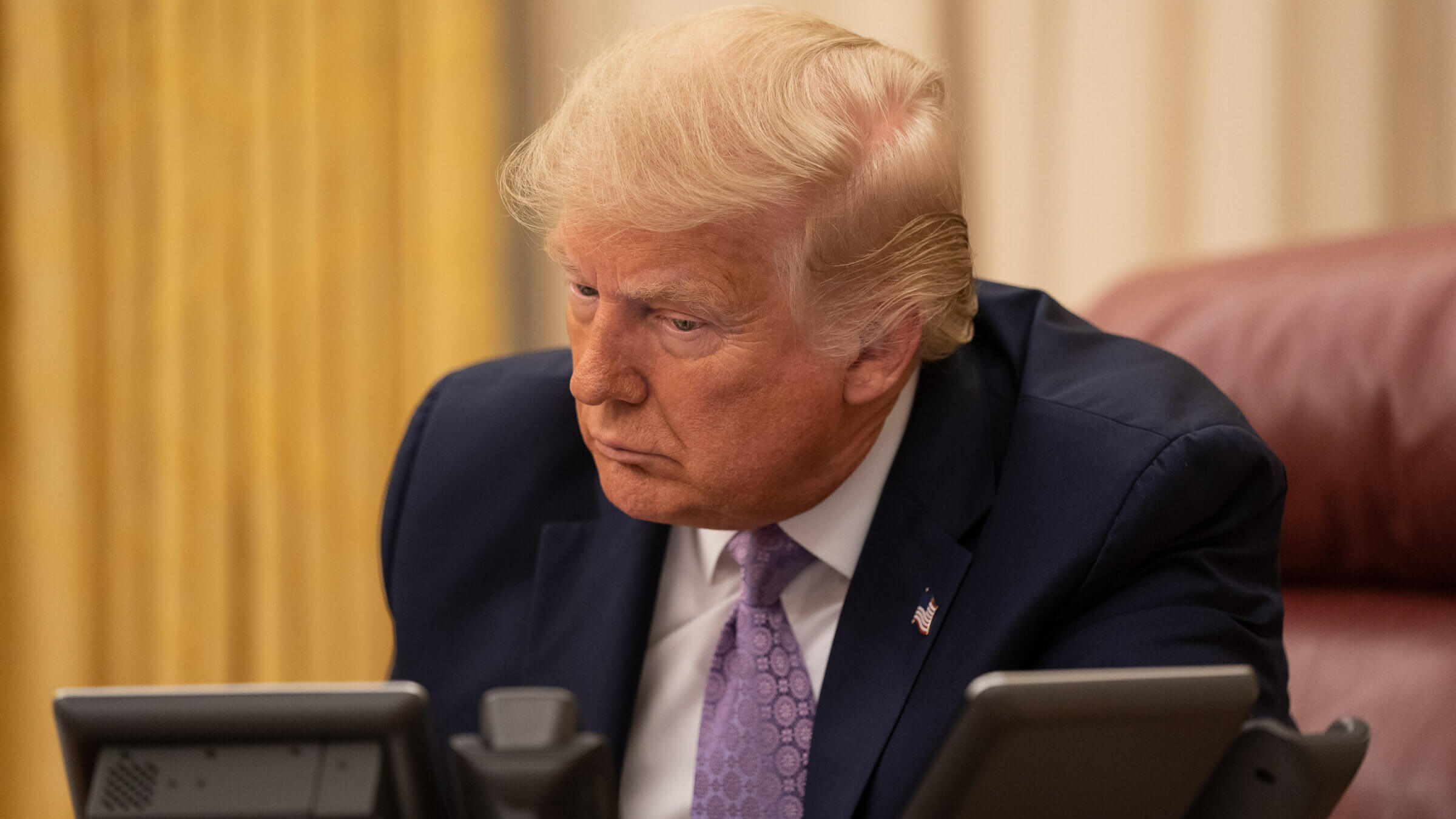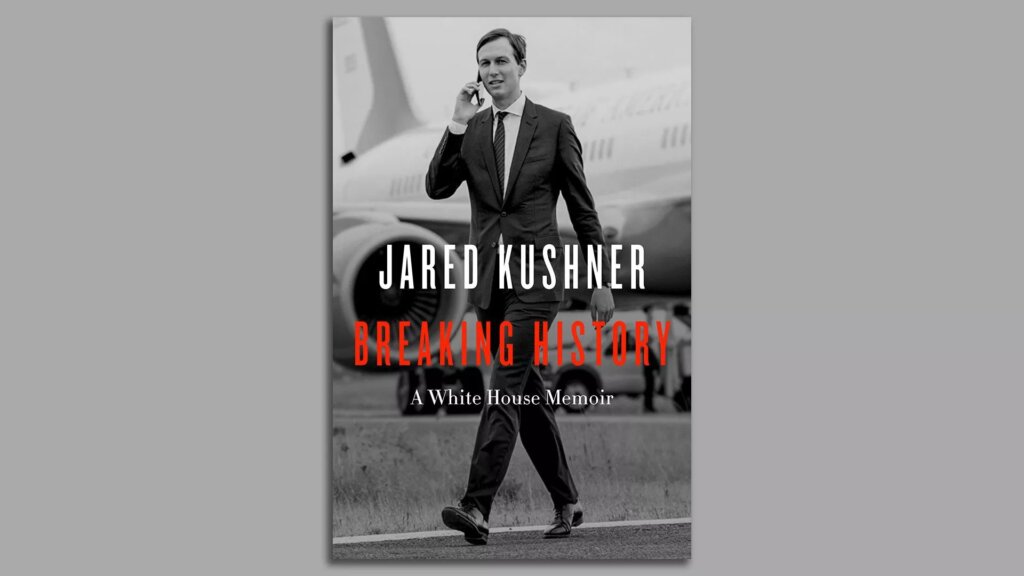Kushner: Netanyahu almost thwarted Trump’s embassy move to Jerusalem
‘Bibi, I think you are the problem,’ the president told the prime minister in a tense phone call

President Donald Trump speaks by phone with Prime Minister Benjamin Netanyahu of Israel and Sheikh Mohammed Bin Zayed of the United Arab Emirates on Aug. 13, 2020. Photo by Official White House Photo by Joyce N. Boghosian
Former President Donald Trump almost took back his decision to move the U.S. Embassy from Tel Aviv to Jerusalem in 2017 after a tense call with then-Israeli Prime Minister Benjamin Netanyahu, Jared Kushner writes in his forthcoming memoir.
Kushner, Trump’s son-in-law, trusted adviser and point person on the Middle East, recalls the phone call Trump placed to Netanyahu on Dec. 5, 2017, ahead of the formal announcement, in “Breaking History: A White House Memoir,” slated for publication by Broadside Books on Aug. 23.
A leaked copy of the book was posted online earlier this week, claimed to be obtained by a foreign ministry official from Saudi Arabia. Kushner’s is one of several memoirs that detail a behind-the-scenes account of the Trump administration’s Arab-Israeli peace efforts, which the White House billed as an attempt to change the dynamic of the Israeli-Palestinian conflict.
Kushner said Netanyahu’s tepid reaction disappointed Trump, who had resisted pressure from his national security team – including Secretary of State Rex Tillerson and Defense Secretary James Mattis – to side with his son-in-law and the ambassador to Israel, David Friedman. “If you choose to do that, I will support you,” Kushner recounts Netanyahu saying. Thinking the Israeli leader did not fully understand the implications, Trump then repeated that he was going to recognize Jerusalem as the capital of Israel and move the embassy. “Again, Bibi responded with less-than-expected enthusiasm,” the book says.
As the conversation continued, “Trump began to second-guess his decision,” Kushner writes, and he “wondered aloud why he was taking this risk if the Israeli prime minister didn’t think it was that important.” The president’s voice then hardened into a stern tone: “Bibi, I think you are the problem,” Trump told Netanyahu, who “coolly countered” that he was part of the solution.
“I could tell that Trump was frustrated,” Kushner adds.
Trump went ahead with the decision a day later, and refused to take calls from Arab leaders angered by the move.
Years later, on the 2020 campaign trail, Trump boasted that the embassy move was done to appeal to evangelical Christians. “The evangelicals are more excited about that than Jewish people,” he said at an Aug.18 campaign rally.
Kushner also recounts Trump expressing anger at Netanyahu for a prolonged, multicourse dinner on the first day of his 2017 trip to Israel. “The guy kept me up for three hours and was talking my ear off,” Trump told his son-in-law. “It was beautiful, but every time I thought the meal would end, another course would come out.”
Kushner writes that he jokingly referred to the episode as a failure of Israeli intelligence: “Bibi should have known his audience better— he would have won Trump’s favor if he had simply served a hamburger and allowed him to go to the hotel to relax.”

Trump did not travel to Israel for the embassy opening in 2018 to allow Kushner to take the spotlight, according to the book. Following his speech at the ceremony, Kushner writes, his sister Dara remarked, “Bubby and Zayda would be so proud. Only God could write this script.”
Despite the brief hiccups, Netanyahu and Trump maintained a genial relationship, until Trump blasted the former prime minister for congratulating Joe Biden on winning the 2020 election while Trump was still contesting the results.
Netanyahu, the current opposition leader, is vying to return to power in Israel’s November elections, the country’s fifth in less than four years. His Likud Party is currently leading in the polls. Trump, on something of a parallel track, is flirting with a 2024 bid to return to the White House.
The Auschwitz experience
In the book, Kushner detailed an emotional tour of the Auschwitz-Birkenau Nazi concentration camp with then-Vice President Mike Pence in 2019.
Kushner first visited Auschwitz as a high school senior, after convincing his headmaster that it would have a lifelong impact on him. On that tour, Kushner writes, he decided to become even more dedicated to his Orthodox religious practice, after a tour guide shared the story of his father — the man smuggled his tefillin into the camp and risked his life wrapping it around his arm for morning prayers as the Nazis forced the prisoners to line up and march in the yard.
“As a teenager, too often I skipped the morning ritual,” he writes. “The story in Auschwitz inspired me to change my ways. If these prisoners were willing to die for their faith, I should embrace my freedom and make a better effort. From that day forward, I’ve started my mornings by wrapping the leather band around my arm and praying.”
Kushner recalls that as Air Force Two was taxiing on the runway in Krakow, Pence’s senior adviser Tom Rose came over the public address system and said: “Unlike the grandparents of my three sons, this Jew arrived at Auschwitz not in a cattle car but in a vice presidential motorcade. Today he doesn’t depart Auschwitz as did more than a million Jews, by the night that ‘transformed the small faces of children into smoke under a silent sky.’ Today, he is delivered from that hell upon the wings of eagles on Air Force Two.”
Kushner writes that “Rose put words to what I felt,” and that there wasn’t a dry eye on that plane at that moment.






















